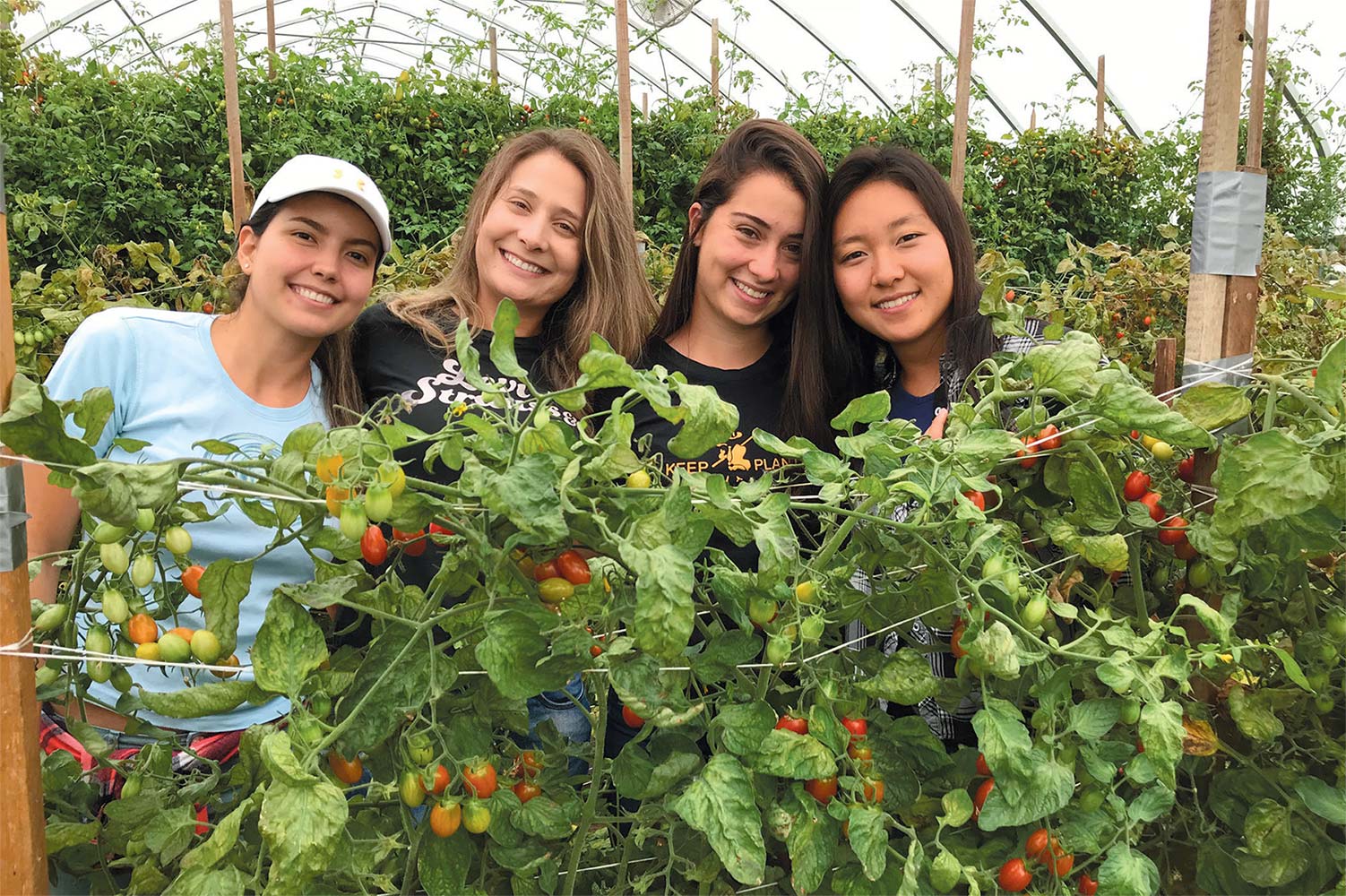Coming to America
FOREIGN STUDENTS TREASURING EXTENSIVE FARM EXPERIENCE
The Sullivan family grows more than great produce; they are assisting in raising some young people whose impact on the international agricultural scene will extend well into the century.
Sully’s Produce is a prominent name on the Door Peninsula’s farm market scene, setting up booths at many of the markets that fi ll the seasonal calendar. Its farm stand and greenhouse on County Highway C west of Sturgeon Bay are a popular stop for those looking for the freshest inseason produce.
But get behind those buildings and the extent of the Sullivan operation is impressive with more greenhouses and fields that require considerable tending. To assist with the work, the Sullivans have been participating in the J-1 Visa Visitor Exchange Program for the past seven years. This year Steve and Char Sullivan have welcomed four students into their home. The couple’s son Mike helps oversee the students’ work schedule, and this year he’s had his largest group of international students.
Mike explains that in previous years the young people have come from throughout the world but this year the four young women hale from South America with three from Brazil and one Colombian.
Founded in 1949, the Minnesota Agricultural Student Trainee program (MAST) was created by Dr. J.O. Christianson to provide young agriculturalists from around the world with the opportunity to come to the United States to live and study with Americans. It’s one of two J-1 programs the Sullivans have used in recruiting seasonal help.
As we sit around the table in the Sullivan kitchen, it’s easy to tell from the smiles on their faces that the women are relishing this experience to live and work on an American farm.
“The four girls have been integrated into the family,” said Char Sullivan. “My three grandchildren love them, and it makes me feel good that they have blended in so well.”
Frankly, it’s hard to imagine a better experience Brazilians Naiara Sousa, Natasha Umezu, Isabella Vieira and Colombian Nathalia Gutierrez could be receiving both culturally and agriculturally. The Sullivans have a lot to do with that.
“They do the same stuff we do,” said Mike. “Everything from the seed to the sale. We show them how to put in an irrigation system, and we’ll let them go to the market alone. Every two weeks it’s a new job – a job they have never done.”
The Sullivans have refi ned their J-1 initiative over the past seven years to give the students a more well-rounded agricultural experience.
“Some of the other locations where these students work, they only do one thing,” he said. The Sullivans have taken it so far that the students have been given the opportunity to raise and sell their own flowers at market. Sousa said selling fl owers is a new concept, since where she’s from they aren’t grown to be sold.
“Maybe I will start growing and selling,” she said with a big smile.
“We want them to understand the cost and the process of production,” he added. “Plus to put a little extra money to their pockets.”
“We actually started that this year and thought it would be a good idea,” said Steve.
Incidentally, the students are paid and given small raises throughout the season based on performance.
In the process the students are immersed in American culture and the English language.
They were introduced to the Door County community at a Buy Local program hosted by the Sullivans this past spring. Each was asked to address the gathering, a challenge each found intimidating. They did well, but now more than two months later they seem much more comfortable with the language, albeit the American slang can cause some problems.
Asked to name a few, they agreed “okee dokee” and “see you later alligator” were a couple of their favorites. When asked if speaking at the Buy Local event was kind of “sink or swim,” they each turned to Mike for a translation.
Gutierrez has found the introduction to new produce to be particularly interesting.
‘They do the same stuff we do. Everything from the seed to the sale.’ – Mike Sullivan, Sully’s Produce
“I didn’t know raspberries, kohlrabi or Brussels sprouts,” she said. “It’s a very different crop than I’m used to.”
But the students not only learn to grow it, but they see how it’s prepared when they all gather around the kitchen table for lunch or dinner.
Gutierrez is particularly fond of birthday cakes.
Taking advantage of an 18-month visa, Sousa knew what to expect since this is her second season at Sully’s after spending the past semester studying at the University of Minnesota.
Last year’s experience has helped Sousa mentor the other women, who all describe themselves as “agricultural engineering” students.
Umezu’s path to the MAST program is particularly interesting, since she left a pretty good paying job with a sugar cane company back in Brazil for a chance to come to America to not only learn new agricultural practices but also get immersed in the culture and language.
“English is so important because it is the language of business today,” said Steve.
Umezu said while her parents were concerned with her decision, they have been supportive.
“I send them a lot of pictures,” she said. “My family is living this with me.”
“This trip is exactly what I expected, to learn how to grow different crops but I can learn everything about everything,” said Vieira. “They get to learn how to become strong ag women,” said Char. Gutierrez said some of the most valuable information she’s learned has come after the harvest. “Learning the value of the produce’s value.”
It’s something that is lacking in South America, where they agreed that poor practices and a long growing season lead to spoilage, something that Mike said his business can’t afford with the shorter season.
The cultural experience is enhanced by a program called “Door County Bridges.” The program provides friendship, assistance and helpful services to international students who come to work in the county.
While most of the students are employed by tourist-related businesses, the girls said the social activities have been particularly fun. At the time of this interview, they seemed particularly curious about the barn dance in September.
Char stressed that whether it’s a Bridges event, working a market stand or sitting around the dinner table, the common trend is the English language.
“It’s a good package,” said Sousa, explaining why she came back for another year.
In the process she learned even more about Sully’s operation and made three close friends in the process.
“They do everything together,” said Char.





